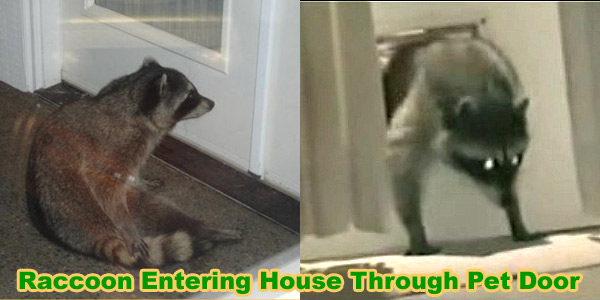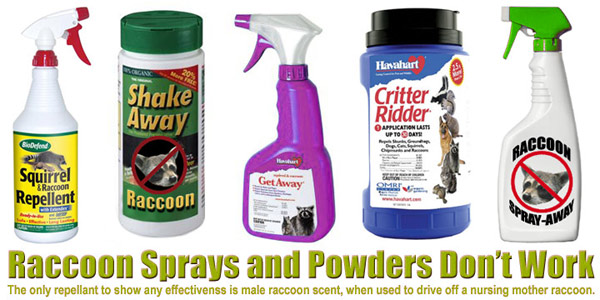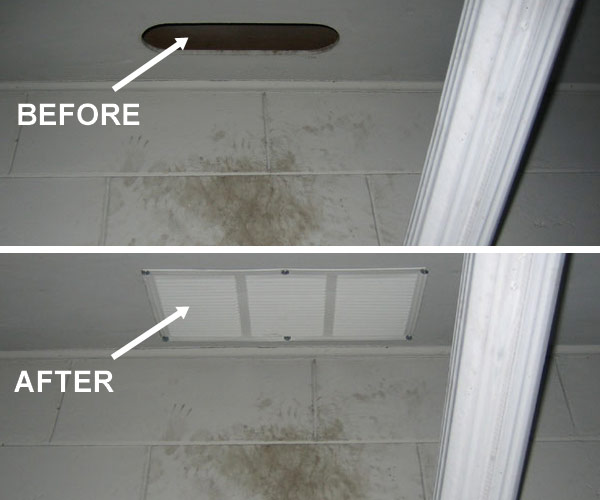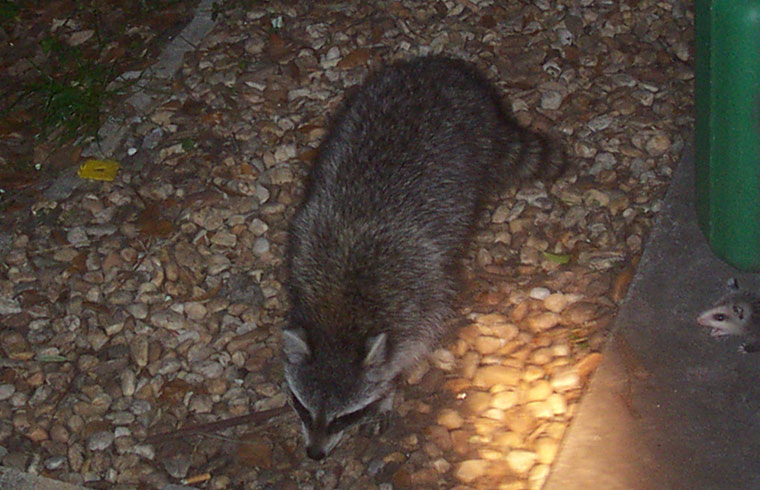- info@wildlife-removal.com
Call us for help in your town
Wildlife Removal Education
How to Keep Raccoons Away
Need raccoon removal in your hometown? We service over 500 USA locations! Click here to hire us in your town and check prices - updated for year 2020.
- 1 - Seal shut all entry points into your house and attic
- 2 - Install an exclusion barrier around the perimeter of your shed or porch
- 3 - Keep pet food and bird seed indoors
- 4 - Strap down the lids of your garbage cans, tightly
- 5 - Block access to the pool or decorative pond
- 6 - Install the slickest tallest fence possible
- 7 - Remember, repellent powders and sprays don't work
- 8 - Water sprayers and sound machines don't work either
- 9 - Trapping and removal is often the only effective solution

It's hard to keep raccoons from accessing your property. It would take a special fence to prevent them from climbing it - they are amazing climbers. And there are no machines or devices that can keep them away - products such as flashing
lights, sound machines, and water sprinklers have demonstrated no effectiveness. I've already discussed the ineffectiveness of repellents such as sprays or powders. The truth here is that raccoons on your property or in your yard are
not really a problem. The problem is that they are interacting with some part of your property that you don't want, right? Like, they're getting into your garbage, or eating your birdseed, or living under your shed or porch, or
tearing up your new sod, or pooping in your pool, or eating your crops, or killing your decorative goldfish, or threating your cat, and so on. That's the key - something about your property is
attracting the raccoons! The best way
to keep them away is by eliminating the attractive source, or by making it
inaccessible. If they are getting into your house, seal shut the entry holes! If they are eating your pet's food, bring the pet food indoors.
If you need help, click my list of 100's of professional raccoon trappers serving all 50 states.

Sometimes a big aggressive dog can keep them away, or a motion-activated water sprinkler. Read more about What Are Raccoons Scared Of?
How to keep raccoons away from your property - Raccoons are not completely wild; many have adapted to living in the city. The raccoons are now living in the suburbs or cities compared to living in their natural environment. The raccoons are known to be agile, curious and smart, and it is hard to be able to make sure that they do not come in your place. Wildlife refers to undomesticated animal species that live in their natural habitats in the wild in environments where they were not introduced by humans. Wildlife are present in every type of ecosystem. Traditionally wildlife is a term for animals that have not been affected by human activities, but in most cases wildlife has been affected by human activities in some way.
It is very difficult to keep the raccoons out completely – only the best fence is able to achieve this. There are several methods you can try to see what works best in keeping these pesky animals away. You may try a motion sensitive water sprayer or you can try relocation or trapping. These methods could prove to be very effective, but you have to be aware there is a chance that the raccoons will come back. This is why fencing is one of the most effective options. What you should do is minimize the damage that the raccoons may make in your home. You should also identify why the raccoons decide to come to your house, for example, if they follow the bird seed, pet food or something else. The raccoons may come because of garbage, pond fish or a shed where they are able to live. You should then start by eliminating these things so that you may not attract raccoons.
You should know that normally there is no repellent that can keep the raccoon away. There are many bogus products available, but they do not work. The decorative ponds that have fish call to the raccoons. You may install large gauge steel mesh to protect the pond and the fish will hide under them. Some people also may use cinderblock. You may also try to trap and remove the raccoons. The raccoons also can come in your place to swim, to bathe and also to poop in the swimming pool. You may consider trapping and removing them or you may use planks of wood with some nails at the bottom to keep the raccoons out.
For more information about raccoons, visit my main raccoon removal page.

Will a high pitch sound deterrent machine work to keep raccoons away?
With so many raccoons entering our homes, we are all in the desperate search of a lasting solution to handle the issue once and for all, and keep away the raccoons permanently. With this desperation comes so many products and claims all over the market. Many people end up
buying products that don’t work at all and you may be surprised at the claims that such companies make in the effort to market their products to the unsuspecting public. Some of the machines and products are based on theory only and none have been tested to see how effective they are in real life. Raccoon Prevention
One of the devices that have gained a lot of popularity is the high pitch sound deterrent machine or the ultrasonic electronic insect and pest raccoon repellent. These are devices which come with the claim that they can drive away any kind of critter, such as raccoon, with great ease. The high
frequency sound waves are said to be something that the insects and rodents cannot be able to tolerate. However, you should be ready as plugging in one of these devices may not bring that magical end to the woes you may be having regarding pests within your home. You need to understand their
working mechanism before you go out of your way to get one for yourself.
Many warnings have been sent to the manufacturers of these kinds of devices and the demand was that the effectiveness that is so highly praised be backed up with some scientific research. It is because of this intervention that you find that the package claims are no longer as preposterous
as they were before. There are now product websites bearing links that aim at explaining the research that they used and the results that were gathered. Wild animals are not the ones that can be kept as pets in homes. These are also not allowed to be entered in homes, attic, or any place
where the human are to move about. This is just because of the threats and dangers which is caused by the raccoon's presence.
When you take your time to go through the products, you discover that the results that were gathered are not true. There are no raccoon repellent devices that have any level of success. This is only to tell the consumers that the
products should never be bought so as to get a quick fix to your critter problem. There is nothing like one hundred percent effectiveness, and that comes with raccoon raccoon trapping and removal, or with preventative repairs.
How to keep raccoons away from bird feeders: there are actually some very good squirrel-proof and raccoon-proof bird feeders for sale. But if they are already getting into your current birdfeeder, your only option is to remove the seed for a few weeks. Or get a new feeder. The Full Guide to Keeping Raccoons Out of Your Bird Feeder and
The Full Guide to Keeping Raccoons Out of Your Chicken Coop
How to keep raccoons away from trash: strap the lids to the garbage cans shut with strong bungee cords (drill holes to affix the straps). Or bring the garbage in for a couple of weeks until the raccoons stop the habit.
How to keep raccoons away from cat food: if the cat food is outside, impossible! If it's inside, problem solved! Just don't leave the cat food outside or even inside a pet door. The raccoons will get it. Bring it inside for a couple of weeks until the raccoons give up, then bring it back outside if you must. But prepare for new critter problems.
How to keep raccoons away from corn: you can try spraying super hot sauce on the corn, but that doesn't work if you want to harvest and eat it! You can also try a motion-controlled water sprayer. But that doesn't work too well. It is very hard to keep raccoons away from corn. Your best bet in this case might be trapping and removal of the offending animals.
How to keep raccoons away from campsite: don't leave any food out! It's that simple.
How to keep raccoons away from garden: the best bet is a sturdy fence, metal bars that are hard to climb, at least 6 feet tall. Or a screened-in garden enclosure or greenhouse. You can also try to harvest all fruit and vegetables before the raccoons get it. Or you may just want to trap and remove the critters.
How to keep raccoons away from yard: It's very hard to keep raccoons out of your yard. The best way to do it is to eliminate whatever is attracting them! If that is not an option, you can also try a motion-controlled water sprayer. But that doesn't work too well. Your best bet in this case might be trapping and removal of the offending animals.
How to keep raccoons away from pool: the best bet is a sturdy fence, metal bars that are hard to climb, at least 6 feet tall. Or a screened-in pool enclosure. To prevent them from entering the pool, you can drive hundreds of nails into a wooden board and place that on the pool steps.
5 Things You Need to Know about Keeping Raccoons Away From Your Property
There are five things that you need to remember when you have a raccoon infestation and want to get rid of it:

1 - All sources of food must be removed or locked away.
2 - You must remove all debris and garden waste from your property.
3 - Your home needs to be well-maintained and regularly inspected.
4 - The problem must be dealt with as soon as possible.
5 - Wildlife rehabilitators are the perfect solution for a problematic raccoon.
A raccoon will come to your property for one of four reasons. It is looking for a source of food, a source of water, a source of shelter, or it is just plain curious. In order to STOP a raccoon coming to your property, you will need to eradicate the things that are attracting it in the first place. This is why the 5 above points should be remembered.
By removing all food sources, you are cutting off one of the biggest reasons that a raccoon would visit your property. Food for a raccoon could be garbage cans knocked over and the contents (leftovers or bad food) devoured. Ponds contain fish and other marine life that the raccoon will also eat. Insects are easily found underground, especially after some rain, and plenty of plant life provides sustenance too. Fruits and vegetables patches are hard-hit areas, but even foods that you wouldn't class as edible will come under attack.
Don't leave pet food outside. Don't leave pet food in a garage or outbuilding that isn't secure. While we're on the subject of secure outbuildings, you should put your garbage can into a secure outbuilding too, if you have the opportunity.
Bird feeders should be either taken down entirely, or modified so that raccoons can't get to them. Any feed that falls down the feeder when birds are eating should be cleared away immediately. This will attract rodents just as much as it will attract raccoons and the same goes for other sources of food too.
When you're done removing all food sources, you should have a good tidy up. Most wild animals would prefer to move through a messy garden than a tidy one. Why? Because the messy one offers up plenty of protection in the form of hiding spots, and the tidy one does not. A garden that has rock piles, garden waste, and piles of wood all over the place gives any wild animal plenty of shelter or protection. If those areas aren't there, the animals can't set up home. They also will be less inclined to check out your property at all. (Note: less inclined. This is a process of actions that collectively lead to the removal of the animal.)
If you take care of your home, your home will take care of you. If you don't, it won't. That's as simple as it gets really. If you don't look after your home, leaving it to form holes and cracks all over the place, garbage left around the place, and damage not repaired or restored, it can't take care of you and keep you safe. It will let in intruders, starting with the small and furry ones. Rats and mice might come along, raccoons too, and perhaps even foxes, opossums, skunks, and more. The more rundown your building is, the better for the animal. You're just making its life a lot easier.
When you regularly inspect and maintain your home, you have the chance to spot damage so that you can then repair it before a wild critter moves on. You can clean up any mess quickly, helping with the whole raccoon roundworm problem. The eggs of that particular roundworm species aren't usually infective for the first couple of weeks (two to four), so a quick turnaround of cleaning up times will greatly help your chances of reducing the disease threats.
If you don't inspect and maintain your home, the raccoon has plenty of time to break in, cause plenty of damage that you will need to pay out to repair, and maybe even put your life and the lives of your family members (including pets) in danger.
That covers point number 4 we made too - the quicker you can get rid of the animal, the less damage it will have caused, the less feces, urine, and other infectious biological matter is hanging around to spread disease, and the easier it will actually be to get rid of the animal too. Once it has the chance to explore your home from the inside, who knows what secret hiding spots it might unveil ... Just not to you.
Finally, when all else fails, the wildlife rehabilitators are there to put things right. Sadly, these are usually the last guys you'd call, after all of your own efforts have proved useless. With equipment, knowledge, experience, and appropriate licenses and insurance on their side, they're exactly the people you should be putting your trust and faith in when you come up against a problem like this one.
Go back to the Raccoon Removal page, or learn tips to do it yourself with my How to Get Rid of Raccoons guide.


















